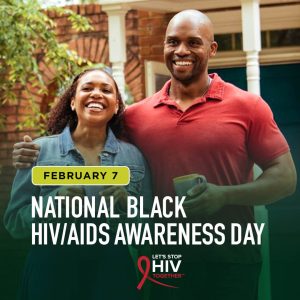
National Black HIV/AIDS Awareness Day (NBHAAD) is February 7th. NBHAAD is an opportunity to address the disproportionate impact HIV/AIDS continues to have on the Black community, end HIV transmission, increase support for those living with the virus, and reduce stigma.
In 2019, Black people accounted for 13% of the population, but 42% (15,305) of the 36,801 new HIV diagnoses in the U.S. Black same-gender loving men and women of transgender experience represent a disproportionate number of people living with HIV. However, Black women made up 54% of new HIV diagnoses among women. In 2020, 481,815 people in the Southern U.S. were living with HIV – the region of the country with the most significant number of Black LGBTQ+/Same-Gender loving people. 52.2% of those living with HIV in the South were Black. Additionally, heterosexual Black women of cisgender experience made up 13% of the female population in the U.S., but 54% of new HIV diagnoses among women – the vast majority of their transmissions came from heterosexual men.
The good news is that TOGETHER we can end the HIV/AIDS epidemic. There are daily medications that can prevent transmission and treat the disease. NBJC created the Words Matter HIV Toolkit to help facilitate meaningful, stigma-free conversations about HIV/AIDS to educate our people.
Learn more about how HIV affects Black people and what action you can take on NBHAAD by downloading NBJC’s National Black HIV/AIDS Awareness Day Toolkit here.
NBJC has created the Words Matter HIV Toolkit to support Black people in having asset-based, stigma-free conversations about holistic health and wellness and encourages loved ones to stay healthy by taking medicine if they are living with HIV or are on PrEP.
On NBHAAD NBJC will create a virtual safe space to inspire, inform, and empower people to know their HIV status and get tested. Join us to learn about HIV testing, get tested in the way that is most comfortable for you, and send a tweet using #TalkAndGetTested.
Get tested to know your status. Doctors recommend testing every three to six months. You can find a testing site near you HERE or get a free at-home HIV testing kit HERE.
Digital Assets:
You can engage in National Black HIV/AIDS Awareness Day and help spread essential information about HIV testing by using the NBHAAD toolkit and digital assets provided by NBJC and the CDC. Share these assets across social media platforms to start a conversation with those who follow you and use the hashtags: #NBHAAD, #StopHIVTogether, and #PACT4HIV.








